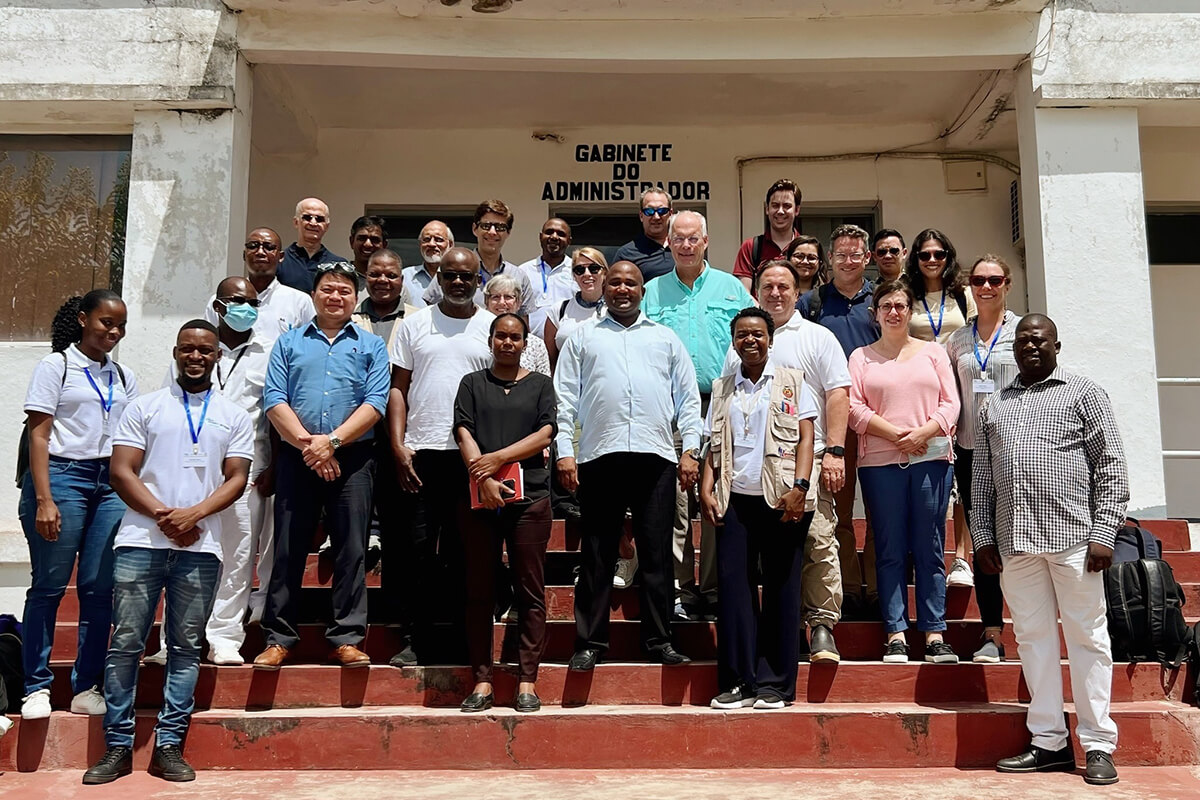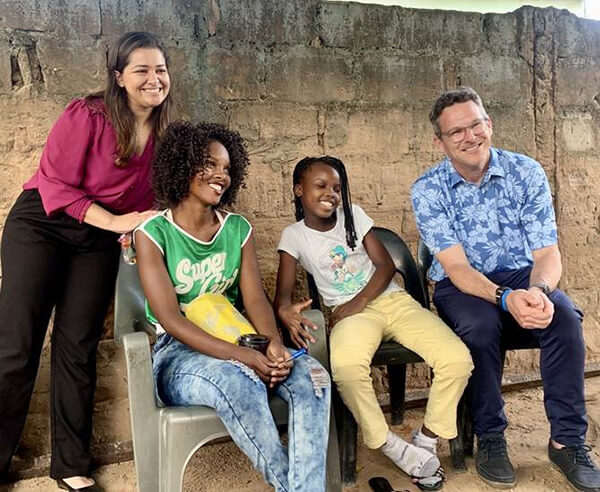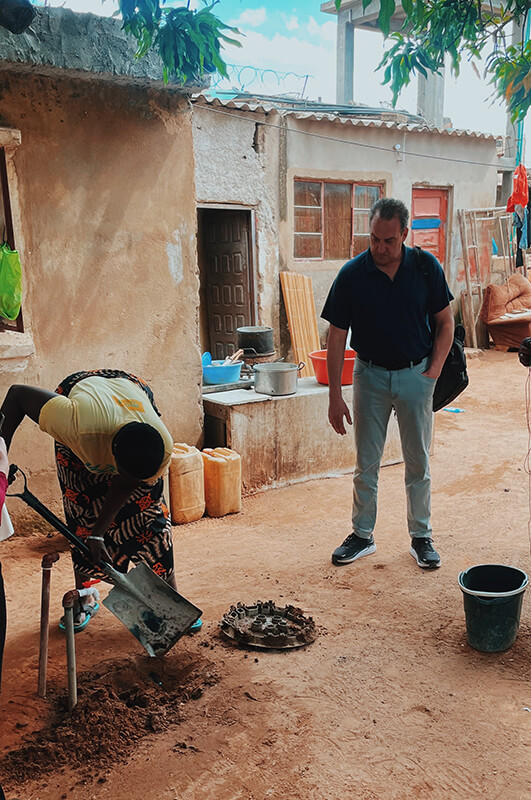
Pictured above: Breakthrough T1D leadership and global healthcare partners in front of the Nhamatanda District Hospital administration office in Mozambique
For the first time, we have a more comprehensive understanding of type 1 diabetes (T1D) around the world. The T1D Index, released in 2022, shows a global crisis: hundreds of thousands of people with T1D do not have access to the tools they need to manage the condition, namely insulin and basic blood glucose monitoring.
Improved health outcomes and equal access to T1D care are an important part of Breakthrough T1D’s global strategy. We have a plan to accelerate towards those goals with the help of key partners like The Leona M. and Harry B. Helmsley Charitable Trust. Together, we are tackling four key interventions guided by the T1D Index:
- timely diagnosis
- access to insulin and test strips
- access to insulin pumps and continuous glucose monitors
- research investment in prevention and cures
A recent trip to Mozambique revealed some hopeful progress in improving the lives of people with T1D, but also highlighted tremendous need and how far we still have to go in achieving health equity.
Creating a Path to Improved Health Outcomes in Africa
Aaron J. Kowalski, Ph.D., Breakthrough T1D Chief Executive Officer, Sydney Yovic, Breakthrough T1D Chief of Staff and Chief Strategy Officer, and Grant Beard, Breakthrough T1D International Board of Directors Chair, recently traveled to Maputo and Nhamatanda in Mozambique to get a firsthand look at the progress Breakthrough T1D and its global partners are making towards closing gaps in access to essential T1D care. Breakthrough T1D joined representatives from the American Heart Association, Foundation for Cardiovascular Care in Africa, The Helmsley Charitable Trust, Non-Communicable Diseases and Injuries (NCDI) Poverty Network, UNICEF, World Diabetes Federation, and World Health Organization.
The care model, endorsed by the World Health Organization, is called Package of Essential Non-Communicable Disease Interventions (PEN)-Plus. PEN-Plus is an integrated care delivery strategy focused on alleviating the non-communicable disease (NCD) burden among the poorest children and young adults by increasing the accessibility and quality of chronic care services for severe NCDs—such as type 1 diabetes, rheumatic heart disease and sickle cell disease—in the rural areas of low- and lower-middle-income countries where more than 90 percent of the world’s poorest people live.
This global outreach initiative is a funded collaboration with the NCDI Poverty Network, Brigham and Women’s Hospital, Harvard Medical School, and Partners in Health.
“Establishing basic care for people with type 1 diabetes is a critical part of Breakthrough T1D’s strategy,” Yovic said. “PEN-Plus gives us the opportunity to advance our global access efforts in a collaborative and quantifiable way.”
On the Frontlines of Healthcare
In the capital of Maputo, Breakthrough T1D met with frontline healthcare workers in Mozambique. Universidade Eduardo Mondlane and NCDI Poverty Team leadership discussed the achievements and opportunities to further improve PEN-Plus healthcare implementation.
Healthcare team at the Breakthrough T1D-supported PEN-Plus clinic at Nhamatanda Rural Hospital
“We gained valuable insights about the daily challenges faced by patients to manage their chronic diseases, which underscored the need to act with urgency,” said James Reid, Program Officer, The Helmsley Charitable Trust. “While PEN-Plus implementation is in an early stage in Mozambique, we left confident that through close collaboration with the government and partners, we have a clear path to improve health outcomes and ensure people living with T1D and other NCDs can thrive.”
The team also visited a Breakthrough T1D-supported PEN-Plus clinic in Nhamatanda. There, they witnessed the tremendous need for T1D tools and education and how PEN-Plus can bridge the major gaps in access to trained healthcare providers and essential supplies.
While in Maputo, they also met a young girl named Estrella.
Estrela’s Story

Apoorva Gomber, Estrela’s mom, Estrela, and Aaron Kowalski in Maputo
Estrela is 12 years old and lives in Maputo. Several months ago, she developed sores on her feet that would not heal. After an initial misdiagnosis, Estrela received a correct diagnosis of T1D. She hasn’t been able to return to school since her diagnosis because of the sores and because her mother worries about the lack of awareness and support for T1D in school. There are currently no PEN-Plus clinics near Maputo, so finding proper care for Estrela is difficult.

Estrela’s grandmother shows David Panzirer of the The Helmsley Charitable Trust how they store insulin underground to keep it cool
Like 70% of her country, Estrela doesn’t have electricity, so she stores her insulin in a hole in the ground to keep it cool. She also didn’t have a glucometer to measure her blood sugar, making it nearly impossible for her to effectively manage her T1D.
Apoorva Gomber, NCDI Associate Advocacy Director, and Aaron Kowalski, Breakthrough T1D CEO, provided Estrela with a glucometer and showed her how to use it. They also shared with her that they both have T1D, which Estrela’s mother could not believe. “She said we must have another disease because we grew up to be big, and she didn’t think that would happen for her daughter,” Kowalski said.
The Hurdles We Face
The challenges faced by Estrela and the T1D community in Mozambique are, unfortunately, common in low-income countries and reinforce the urgent need for PEN-Plus clinics. The stigma surrounding T1D is rampant—people with T1D often experience bullying and exclusion. Public health assistance, while commonly free, is difficult to access in remote locations and lacks the necessary supplies.
Food insecurity is another serious issue—most people only have enough food for one or two meals a day, which makes insulin dosing difficult. Decreased insulin dosages due to lack of food lead to more episodes of diabetic ketoacidosis (DKA). And lack of electricity means many people with T1D must bury their insulin underground to keep it cool and often worry that it has gone bad.
As partners work to improve access to care, there will be opportunities to elevate the standard of care, such as transitioning from human to analog insulins, which are the standard of care in high-income countries.
Expanding Our Footprint to Save Lives
The Breakthrough T1D-supported NCDI Poverty Network is driving efforts to train clinicians and create a sustainable healthcare model for low-income countries. They are determined to save lives for these treatable conditions.
“If there is a way to help people to survive with T1D, even one day to enjoy life with T1D, we must try,” an NCDI nurse said.
These important steps in global access are improving T1D care for tens of thousands of patients in significantly under-resourced countries.
“By expanding Breakthrough T1D’s global footprint, we develop a more powerful and unified voice, which means more people aware of and supporting our cause,” said Grant Beard, Chair of Breakthrough T1D’s International Board of Directors. “This will ultimately save countless lives.”